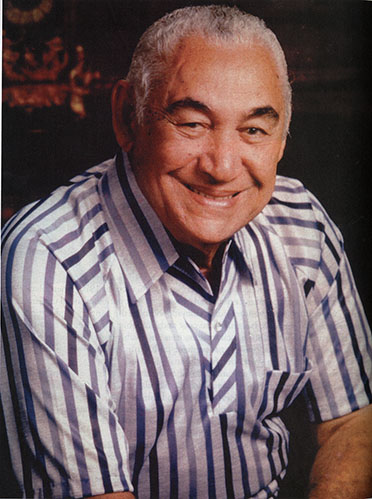Kenneth Khouri (1917 - 2003)

Kenneth Khouri
(1917 – 2003)
Kenneth Khouri was born 1917 in St. Mary and grew up in the Richmond/Highgate area before migrating to Kingston as a young man. His father who is of Lebanese ancestry came to Jamaica when he was twelve, and never went back until he was seventy-one. His mother was born in Jamaica of Cuban parents.
Khouri’s father was in haberdashery and also had furniture stores in Kingston, so Khouri’s early working life was in this area. When Khouri came to Kingston he joined the firm of E.A. Issa and Brothers Limited working with Joseph Issa. He also went into the furniture business after leaving the firm. Issa used to have jukeboxes around the island, this was Khouri’s passion.
Kenneth Khouri’s work in the music business began when his father got ill. At this time he could never had imagined this would have led to the foundation of his legacy. His father was an influential man in political circles so it was no surprise when Khouri sought assistance from Norman Washington Manley; he needed a passport to take his father to Miami for an operation.
Manley made arrangements for him to get the necessary documents and be transported by ambulance from the airport in Miami to the Jackson Memorial Hospital. During this time, Khouri decided to rent a car. The first day he had the car, the radio stopped working and it was while he was dealing with this problem at the rental agency that he overheard a man seeking help. The man was selling a disc recording machine; he demonstrated its use by recording a disc from a radio. Khouri gave him US$350 for the machine and one hundred discs.
With the one hundred discs Khouri returned to Jamaica and started to cut voice recordings on the machine. Ken Khouri started to realize the economic and commercial potential of the machine, so in addition to recording voices he started to record music – this can be regarded as the start of the modern recording industry in Jamaica.
His business operated from a club located at Red Gal Ring and at his home. He would go around recording calypso at various nightclubs. With his business showing some commercial success, Khouri made the bold move of calling Decca Records in London and agreed to make records from discs for the purpose of selling. He would order the 78s discs from England, then after he made them he would send them as masters to Decca, while they would make a record out of it and send it back to him. The records were pressed in 78rpm SP format. Khouri established Jamaica’s first pressing plant which was called Record Limited. These records were imported back to Jamaica and were sold at his general store. The first song that Khouri recorded was Lord Flea’s ‘Naughty Little Flea’ (Where Did the Little Flea Go).
Khouri turned to local businessman, Alec Durie of Times Variety Store on King Street in Kingston for support; Times would become the sole distributor of the records. Durie supported the idea and they both started the Times Record Label. Durie sold the records and gave Khouri the difference. This venture paid off after their first attempt; records were sold out in less than two weeks of advertising.
Khouri considered himself to be a pioneer because he shared that at that time nobody else had recording facilities in Jamaica. Seeing this success, Khouri was encouraged to start manufacturing records. He stopped sending them to Decca Records in London and arranged with a factory in California to send him the machinery and the expertise that would teach him the technique over a period of three months. Khouri learnt enough to set up a store at 129 King Street, between Charles and North Street with a press with boiler; there he started recording Jamaican mento bands. Local mento and jazz musicians would gather at nights to record songs using a single microphone and one track. In 1954 Khouri made the Pioneer Company do 78s and albums and foreign and local material. Ken Khouri started to press records for Mercury under a franchise, among other franchises from the United States. Khouri’s business was now growing and he eventually opened a studio.
In 1957 he moved to the Industrial Estate at Marcus Garvey Drive and formed Federal Records; Records Limited became its subsidiary. In 1961 during the period of the West Indian Federation, he set up a studio and factory at the same location which became Federal Records Manufacturing Company Limited. During Federal’s expansion, Khouri approached major American Record Companies such as Capital and others and became their franchise. Worldwide hits were now being pressed and distributed in Jamaica. Federal Records started to monopolize the island’s American popular music as it related to sales and distributions. Federal had all the facilities needed for vinyl record productions such as the Recording Studio, the Mastering Studio, the Photo Studio, the Design Laboratory and the Pressing Plant which were fully equipped.
Ken Khouri also had early association with other pioneers of Jamaican music; Producer Edward Seaga who had owned West Indies Recording Limited (WIRL) had the franchise for Columbia Records in Jamaica. Khouri manufactured and sold Seaga’s business to Byron Lee and that Studio is now called Dynamic Sounds Limited. In an interview with Balford Henry, Khouri was quoted as saying Chris Blackwell had begged him to join him in London when he went there to start Island Records. Khouri also considered himself a godfather of many early Jamaican producers including Clement ‘Coxsone’ Dodd, Arthur “Duke” Reid, Prince Buster, King Edwards and Lloyd “Matador” Daley.
After a fire in the late 1960s damaged part of the facility, the studio was reconstructed to an up to date world class studio which had welcomed first class stars from all over the world. Canadian born American singer Paul Anka had visited the studio and even did a recording session. The studio continued to release commercial hits, many broke into local charts.
During the height of the socialist experiment of the 1970s in Jamaica, Khouri and his wife migrated to the United States leaving his sons in charge of the business. The company ran into debts and illness took a toll on him so the business was sold in 1981 to Bob Marley; now called Tuff Gong. Khouri died in 2003. He is remembered as a pioneer in the Jamaican music industry. Kenneth Khouri received a Silver Musgrave Medal from the Institute of Jamaica in 2003 for his contribution to the recording Industry.
Sources:
- Henry, Balford. “Khouri, the pioneer nobody remembers.” The Sunday Gleaner 16 February 1997: 3E. Print.
- Katz, David. Solid Foundation: An Oral History of Reggae. New York: Bloomsbury, 2003.
- Katz, David. “Ken Khouri: “I am the complete pioneer of everything.” Caribbean Beat May/June 2004. 67: 38-39. Print.
- “The Story of Federal Records, Tribute to Kenneth L. Khouri” – ReggaeRecord.com.
- Biographical Notes Files at National Library of Jamaica
